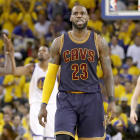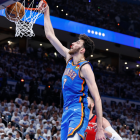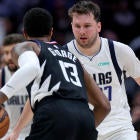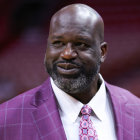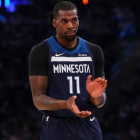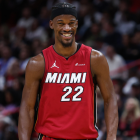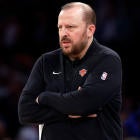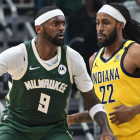The opening game of the NBA Finals did not go the Cleveland Cavaliers' way. They had no answers for the Golden State Warriors' offense, could not control the glass, had by far their worst offensive game of the playoffs and wound up with a 113-91 loss. It's tempting to overreact and declare the series done, but we know that LeBron James and the Cavaliers lost the first two games at Oracle Arena by a total of 48 points this time last year before making their historic comeback.
Here are three adjustments the Cavs could make as they try to avoid falling down 2-0 again:
1. Turn back the clock
Given all of Cleveland's experience against Golden State, its approach to start the series was surprising. It stayed competitive in the 2015 NBA Finals and came back last year largely because it tried to dictate the terms of engagement. Instead of letting the Warriors run wild, the Cavaliers did as much as they could to make each game into a possession-by-possession slugfest. Their major advantage against any opponent is that they employ James, the smartest facilitator and biggest matchup problem in the NBA, and Kyrie Irving, one of the league's best isolation scorers.
Maybe the Cavs thought they could get away with what they'd been doing in the Eastern Conference playoffs. Maybe Golden State is so overwhelming that it will take a while for Cleveland to gets its act together -- coach Tyronn Lue, James and Irving all said there is no way to simulate the Warriors' speed and style of play in practice. Either way, the defending champs seemed to play into their hands by falling into a frenetic, up-and-down game on Thursday. Kevin Durant alone had six dunks in the first half, some of them in transition, and the Cavs can't afford to let that happen.
This does not mean never pushing the ball. When Cleveland has a clear advantage, it should absolutely try to run and score. If Love has an opportunity to throw a touchdown pass, he should go nuts. Golden State's halfcourt defense is too great to waste those sort of chances. If it's not close to a sure thing, though, it's not worth it. In general, the Cavs needs to slow it down, give James the ball and let him go to work.
In some ways, it bums me out to suggest this strategy. Everybody loves beautiful ball movement, and Cleveland has been at its best when running, spacing the floor, moving the ball and launching 3-pointers. In this matchup, however, the Cavs' offense needs to be much more deliberate and, honestly, much less fun.
No one is better than James when it comes to hunting matchups and exploiting defenses' weaknesses. Slowing things down accentuates their theoretical advantage on the glass, which didn't really exist in Game 1. It allows James to play heavy minutes and defend Durant without wearing down. It also can help them be in position to get back in transition, which was an enormous problem.
Beyond all that, the Warriors feed off of getting out on the break and getting open 3s and dunks. They love to play with rhythm and flow and joy. Cleveland's job is to make things ugly and get them out of their comfort zone.
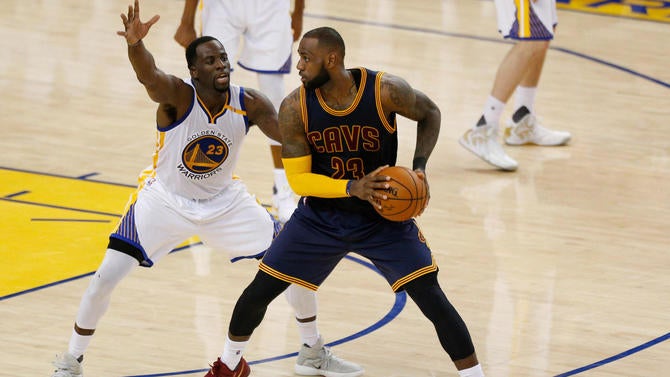
2. Be sharper
OK fine, this isn't exactly an Xs and Os thing, but sheesh, the Cavs have a lot of things to clean up. They turned the ball over 20 times, leading to 21 points off turnovers, an easy way to get blown out by the Warriors.
Cleveland scored just 38 points in the second half. Defensive lapses were not hard to find. James like to call series openers "feel-out games," and it certainly felt like his team was feeling things out rather than asserting itself.
"Our best defense is going to be our offense," Lue said. "Taking care of the basketball. Not a lot of turnovers. Tonight we had 20: that's way too many against this team."
"They capitalized a lot on our mistakes," Irving said.
This isn't entirely unrelated to the first adjustment. One way to reduce turnovers is to simplify everything. If James is pounding the ball like it's the early 2000s, the Cavs should have fewer miscues. But even if they don't change their broader strategy, they're not going to be able to get away with being that sloppy. And the earlier point about being deliberate on offense? That goes double for the defense.
There have been serious questions about Cleveland on that end of the court all season. It seemed like it had answered most of them in the past month and a half, but some skepticism remained because it had given up open looks to role players and relied heavily on blitzing stars. The Warriors are on a completely different level than the Cavs' other opponents, so there would obviously be less room for error in the NBA Finals.
In order to beat this superteam, Cleveland needs to be absolutely locked in. That didn't happen in the first game, but the good news is that it has happened before. Last year's Finals wouldn't have gone the way they did if the Cavs hadn't played as more than the sum of their parts defensively. They were on a string, communicating, and it was clear that they knew exactly what kind of shots they wanted to force.
3. Tinker with the rotation
After a 22-point loss, with the stakes this high, everything should be on the table. Cleveland is probably not going to change its starting lineup, but if its top priority is changing the feel of the series, then Lue should not hesitate in terms of shifting things around.
The Cavs played Richard Jefferson and Kyle Korver together with Kevin Love at center, which is far from optimal defensively. Deron Williams didn't make much of an impact in his 19 minutes. Tristan Thompson, so crucial to their success last season, only played 22 minutes.
Part of this is that Golden State went on a huge run at the beginning of the third quarter. This meant that the Cavs wanted to go to offensive-minded units in order to close the gap. The tone was set earlier on, though, and the Warriors might find it more difficult to find their rhythm if Cleveland prioritized defensive versatility above all else. They also might find it harder to get stops if the Cavs can force some turnovers themselves.
A few disclaimers
- There are not a ton of rotational changes Lue can make. It's easy to say that Love should play less because he's not a great defensive fit against Golden State, but that would hurt the Cavs offensively and on the glass -- he had 15 points and 21 rebounds. It's also easy to say not to play Korver, but does Lue really want to waste that weapon? They don't have a real backup center now because Lue doesn't play Channing Frye against this team, Andrew Bogut hurt himself mere seconds into his Cleveland debut in March and the Larry Sanders experiment didn't work out. If there was an obvious solution, Lue would have figured it out already.
- Dictating the terms of engagement isn't as easy as it sounds. The Cavs can slow things down when they have the ball, but that alone does not guarantee they'll get good looks against the Warriors' fantastic defense. Part of Golden State's game plan is to force turnovers, force contested jumpers and then push the pace.
- Even if Lue pushes all the right buttons, it might not matter. Unlike last season, Stephen Curry is healthy. Unlike last season, Durant is alongside him. This is a totally different challenge, and the Warriors have the talent to beat Cleveland even if games get ugly. The scariest part for the Cavs is that they haven't even seen Golden State's best yet: Klay Thompson and Draymond Green shot just 6-for-28 in Game 1, and it didn't matter. Neither did the Warriors' numerous missed layups.













